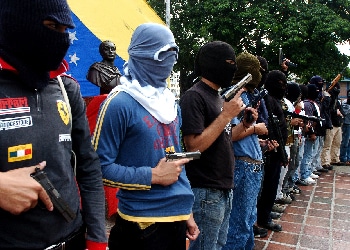In our May 17 Facebook Live session, co-director Jerry McDermott and Spanish editor Ronna Rísquez explained the factors that have transformed Venezuela into a “mafia state” and made the country an organized crime hub for the region.
The investigation “Venezuela: A Mafia State?” is the product of three years of field research in several countries. It exposed how organized crime, corruption and drug trafficking permeate the highest levels of Nicolás Maduro’s government.
“The most frightening thing was discovering the reach of organized crime in the country,” said McDermott.
From the start of the investigation, InSight Crime had information suggesting that around 20 Venezuelan government officials were in some way involved in drug trafficking. By the end of the process, out list has expanded to include the names of 123 high-ranking members of the regime. Some 30 of them are listed in one of the chapters of the investigation, dedicated to the “Cartel of the Suns.”
Moreover, the investigation identified 14 state institutions that had, or have, been infiltrated by drug trafficking, something which McDermott highlights as one of the strongest factors that point to Venezuela being a mafia state.
SEE MORE: Venezuela News and Profile
The first part of the session delved deeper into the Cartel of the Suns, a loose-knit drug trafficking structure made-up of military and Venezuelan officials, who took advantage of the praetorian structure of the state to traffic drugs. This cartel is not a well structured one, added McDermott, saying: “It’s more like a series of criminal networks that occasionally confront each other, but all of them have one thing in common: links to high ranking members of the regime.”
Diosdado Cabello, arguably one of the most influential living members of the regime in Venezuela, has been accused multiple times of being part of this cartel, but so far these claims have been backed by questionable evidence and witnesses. With all the power and influence that Cabello possesses, however, the possibility that he remains unaware of drug trafficking dynamics in the country seems farfetched. A source from the United States Department of Justice told InSight Crime that there is an ongoing case against him.
The second part of the conversation focused on the impact that Venezuelan organized crime has on the region. Venezuela is exporting criminality to other countries such as Honduras. McDermott explained how one specific aerial route was opened between the two countries, which ended up becoming a route to transport cocaine, avoiding Colombian and US radars on the way.
The Dominican Republic is another country that has a connection with organized crime in Venezuela. Between 120 and 150 tons of cocaine pass through its territory, much of which leaves from the Venezuelan coast.
McDermott explained how when the fieldwork was carried out, InSight Crime was able to talk to leaders of the “colectivos,” which grew in power after the coup against Hugo Chávez in 2002. But the colectivos have become increasingly criminalized.
A similar story is that of the “pranes,” prison crime bosses and gangs who have proliferated since the creation of the Ministry of Popular Power for the Penitentiary Service (Ministerio del Poder Popular para el Servicio Penitenciario). McDermott highlighted the actions of the then-prison minister Iris Varela, who handed over the internal power of the prisons to the pranes in an effort to bring down riots and homicides. The “pranes” have outgrown the prisons and are now involved in criminal networks that have control over locel drug trafficking and illegal mining.
Lastly, they spoke about the impact that Colombian organized crime has in Venezuela, through cocaine and guerrilla groups that have infiltrated the country. McDermott also talked Venezuela’s impact on other countries, referring to migration, the upcoming elections, the Colombia peace process and the dissidence of the guerrillas that have established themselves next to the Venezuelan border.
Watch the full video of the Facebook Live discussion (in Spanish) below:

